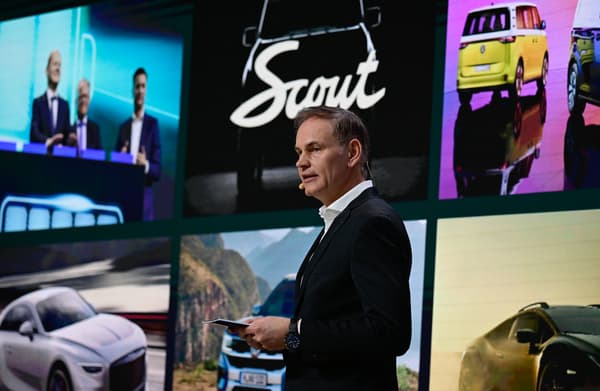If Germany seems to question the planned end of the combustion engine in Europe by 2035, one of its industrial heavyweights keeps investing more to become a leader in electric cars.
This Tuesday, the first European car manufacturer Volkswagen announced that it plans to invest 122,000 million euros in its transition to the electric and connected car. A sum 13% higher than the previous plan and which corresponds to more than two thirds (68%) of its total investments in the next five years, a global endowment of 180,000 million euros.
In 2020, Volkswagen announced an investment of €73 billion over five years in the car of the future. A sum that increased to 89 billion at the end of 2021 and further increases by 30 billion on Tuesday.
Battery factories, automobile factories, supply of raw materials
These 122,000 million euros will be used in particular for the construction of battery cell factories and obtaining the raw materials necessary for the manufacture of batteries, indicates a press release on the occasion of the group’s annual results. At the end of 2021, the group had announced an investment of 89,000 million euros in the car of the future until 2026.
With this endowment, Volkswagen intends in particular to finance the construction of gigafactories, these factories for the production of batteries. The group announced on Monday the opening in 2027 of a fourth factory in Canada, without detailing its plans for Europe, where six factories have already been announced and three already planned in Sweden, Germany and Spain. The Volkswagen subsidiary dedicated to the production of batteries, PowerCo, “should generate an annual turnover of more than 20,000 million euros in 2030,” explains the group in a press release.
Volkswagen wants to focus its investments on its presence in North America and on increasing its sales in China, traditionally its first market, but where Volkswagen fails to prevail in the electric vehicle segment in the face of competition from local manufacturers and American Tesla.

internal software
The German group also wants to build a large network of charging stations in the American continent and plans to invest 2,000 million euros in the construction of a factory to produce electric SUVs under the Scout brand.
“Added to this are the continuous investments in state-of-the-art combustion engines. The peak return on investments should be reached in 2025, to then continuously decline”, develops another press release.
A section of this investment plan will be dedicated in particular to software. In its press release, Volkswagen recalls that it is working on the Volkswagen Automotive Cloud, its future home operating system. Cariad, the group’s software subsidiary, has established offices in Seattle and Silicon Valley.
By 2025, one in five cars sold will be electric.
A figure supports this enormous investment: Volkswagen estimates that “by 2025, one in five vehicles sold worldwide” will be electric.
A good part of these vehicles must be group models for the German giant. In its latest commitments dating from last year, the world’s No. 2 automaker aimed to sell 50% of electric vehicles by 2030 and “nearly 100%” by 2040 in its main markets. The Volkswagen Group is already targeting an 11% share of electric vehicles in its deliveries this year, compared to 7% in 2022.
Increased profitability of the VW group in 2022
The group announced its annual results at the beginning of the month, registering in 2022 a net profit slightly above 2.6% per year (15.9 billion euros), despite a 7% drop in its vehicle deliveries.
The return on sales before exceptional items increased slightly, reaching 8.1% in 2022, thanks to higher prices and sales of more expensive models, benefiting from better margins.
The group of ten brands expects to sell 9.5 million vehicles this year, a good million more than in 2022.
“Supply chain bottlenecks should be gradually eased in 2023,” allowing the group to honor the “high” level of its order book. By 2023, the group expects an increase in its turnover of 10 to 15% and an operating return on sales of between 7.5 and 8.5%.
Source: BFM TV

